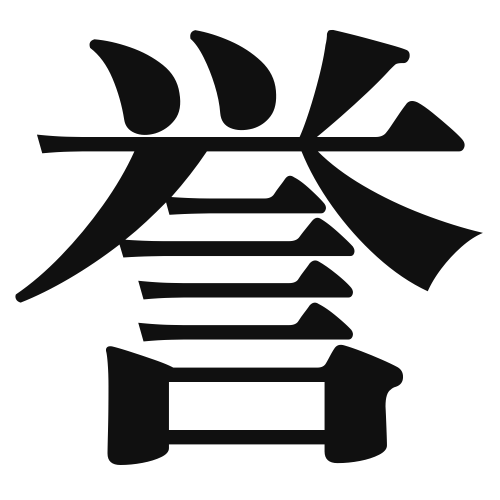1. Overview of Meaning
The kanji “誉” (yomi: “yo”) means “honor” or “reputation.” It conveys a sense of respect and admiration, often associated with achievements or virtuous behavior.
2. Formation and Radical
Formation of the Kanji: The kanji “誉” is a compound character (会意文字) that combines elements to convey its meaning. It consists of the radical for “words” (言) and the character for “to be” (要), suggesting that words can create or reflect honor.
Radical: The radical of “誉” is 言 (gen), which relates to speech or words, emphasizing the importance of communication in establishing honor.
3. Examples of Usage
Common Words and Phrases:
- 誉れ (ほまれ, homare) – honor, glory
- 名誉 (めいよ, meiyo) – fame, honor
Example Sentences in Daily Conversation:
- 彼はその業績で大きな誉れを得た。 (かれはそのぎょうせきでおおきなほまれをえた。) – He gained great honor for his achievements.
- 名誉を守ることは大切です。 (めいよをまもることはたいせつです。) – It is important to protect one’s honor.
4. Synonyms and Antonyms
Similar Kanji:
- 栄誉 (えいよ, eiyo) – glory, honor (often used in a more formal context)
- 尊敬 (そんけい, sonkei) – respect (focuses more on the feeling of respect rather than the honor itself)
Antonyms:
- 恥 (はじ, haji) – shame (the opposite of honor)
- 不名誉 (ふめいよ, fumeiyo) – disgrace (a state of having lost honor)
5. Cultural and Historical Background
Relation to Japanese Culture: In Japanese culture, honor is a significant value, often associated with samurai ethics and the concept of “bushido.” The kanji “誉” reflects this cultural importance.
Proverbs and Idioms:
- 誉れ高き者は、恥を知る (ほまれたかきものは、はじをしる) – Those who are honorable know shame. This proverb emphasizes the balance between honor and humility.
